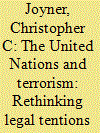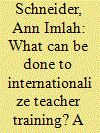|
|
|
Sort Order |
|
|
|
Items / Page
|
|
|
|
|
|
|
| Srl | Item |
| 1 |
ID:
052965


|
|
|
|
|
| Publication |
Aug 2004.
|
| Summary/Abstract |
Since thought about the future can not help but enter into our planning of policy, the International relations community should make it an aim to help systematize these thoughts. One way of doing this is by developing a methodology for scenario building. Much extant work on scenario planning shares a key weakness that is well known in traditional socioeconomic planning, namely a tendency to reify current trends. In order to break with this tendency, this article sets out an approach that we call perspectivist scenario building. We also try to illustrate the points made and demonstrate the value added for planners by reflecting in our own experience in participation-oriented scenario work with Norwegian bureaucratsand politician in the framework of a broad-scoped national scenario project for the Norwegian government inthe period between 1998and 2001, called Norway 2030.
|
|
|
|
|
|
|
|
|
|
|
|
|
|
|
|
| 2 |
ID:
052966


|
|
|
|
|
| Publication |
Aug 2004.
|
| Summary/Abstract |
"Congressional foreign policy enterpreneurs" are those legislators who initiate their own foreign policy agendas. These individuals seek to frame policy discussions and mobilize public and intrest group intrest; to direct congressional agendas toward specific foreign policy issues; to struture and influence the formulation of foreign policies by the executive branch; to revise, refocus, or reformulate foreign policies; to generate alternative and replacement foreign policies; and to fill policy vaccums with their foreign policies. This paper examines the evolution and impact of such entrepreneursacross the period of the Cold War consensus (1946-1967), the Cold War dissensus (1968-1989), and the Post-Cold War(1990-2000). The paper first provides an overview of the concept of foreign policy entrepreneurs. It then turns to case studies of entrepreneurial initiatives from three prolific entrepreneurs whose careers span the post-World War II era : Senators Jacob Javits, Edward Kennedy, and Christopher Dodd. Together, the overview and cases shed light on the different avenues and activities that entrepreneurs use to adress their preferred issues and the impact entrepreneurs have on policy, as well as highlight changes in both over time.
|
|
|
|
|
|
|
|
|
|
|
|
|
|
|
|
| 3 |
ID:
052963


|
|
|
|
|
| Publication |
Aug 2004.
|
| Summary/Abstract |
The conflicting interests that underlie globalization can be difficult to grasp in a traditional classroom setting. The simulation presented here challenges students to examine the many different actors operating in the international system today. The focus is the Chad-Cameroon oil pipeline-a landmark example of cooperation and conflict between international institutions, non-governmental organizations and business interests. Given a scenario, students assume these roles and negotiate for the continued success of the pipeline. All the materials to run this exercise are included and if utilized, can provide a positive active learning experience.
|
|
|
|
|
|
|
|
|
|
|
|
|
|
|
|
| 4 |
ID:
022464


|
|
|
|
|
| Publication |
Aug 2002.
|
| Description |
271-290
|
|
|
|
|
|
|
|
|
|
|
|
|
|
|
|
| 5 |
ID:
052964


|
|
|
| 6 |
ID:
052967


|
|
|
|
|
| Publication |
Aug 2004.
|
| Summary/Abstract |
Inthe late 1950's, the British hitorian Sir Herbert Butterfield observed that we should not welcome the prospect of even a cituous hegemon but should seek, rarher a balance of power. He did so because his understsnding of history suggested that aspirant hegemons succeed principally in precipitating costly wars against them, while his sense of Christian ethics suggested that even a successful virtuous hegemon would become self-righteous and, by imposing its values on others, would curtail the scope of human freedom. I argue that current United States (U.S.) policy and the world's response to it to date confirm Butterfield's position, but that this presents a new set of practical and moral questions centered on the problem of advocating a balance against a country that one regards as broadly virtuous, and certainly more virtuous than many of the other powers in the world, but no longer wants to pursue its intersts through the post- Cold War concert of putative great powers. The best answer to these problems, I conclude, lies not in a crude balance, but the re-institutionalization of the idea of the balance of the power. This requires advocating restraint and self-restraint, the first practical manifestation of which being that the U.S. should not attack either of the surviving members of the "Axis of Evil."
|
|
|
|
|
|
|
|
|
|
|
|
|
|
|
|
| 7 |
ID:
052968


|
|
|
|
|
| Publication |
Aug 2004.
|
| Summary/Abstract |
The following excerpted report discusses the interaction of the international studies field and teacher education progams at colleges and universities around the country. The reform of teacher education in whatever substantive area is a topic at the forefront of initiatives from the federal government in Washington, DC, as well as ones from private foundations. One such initiative has recently been launched by the Carnegie Corporation of New York and is called Teachers for a New Era (TNE). Linking 11 universities across the country, TNE can be viewed as an innovative attempt to better integrate the content education provided by colleges of arts and sciences with the pedagogical knowledge resident in schools of education. The ultimate aim is to impact student learning by producing better classroom teachers nation-wide. The following articles engages many of these same topics as they relate to the international studies education. The editors hope that you will find the article thought-provoking, and we invite comments and responses from members of the ISA community.
|
|
|
|
|
|
|
|
|
|
|
|
|
|
|
|
| 8 |
ID:
052962


|
|
|
|
|
| Publication |
Aug 2004.
|
| Summary/Abstract |
From a critical perspective, preciselywhat kind of knowledge about globalization is meaningful? The distinctive province of a critical orientation to globalization is coming to be defined by a complex of five interacting components: reflexivity, historicism, decentring, cross-overs between social inquiry and other streams of knowledge, and an emphasis on strategic transformations.Critical globalization studies may be employed to identify diverse tendencies in world order, parts of a contradictory whole that coexist, with different logics colliding with one another. These are element of old configuration, multilateral, globalization; the contemporary structure, militarized globalization; and the potential constellation, democratic globalization. The motor of transformation is not only countervailing power but also alternative knowledge, which should be demystifying and enabling.
|
|
|
|
|
|
|
|
|
|
|
|
|
|
|
|
|
|
|
|
|